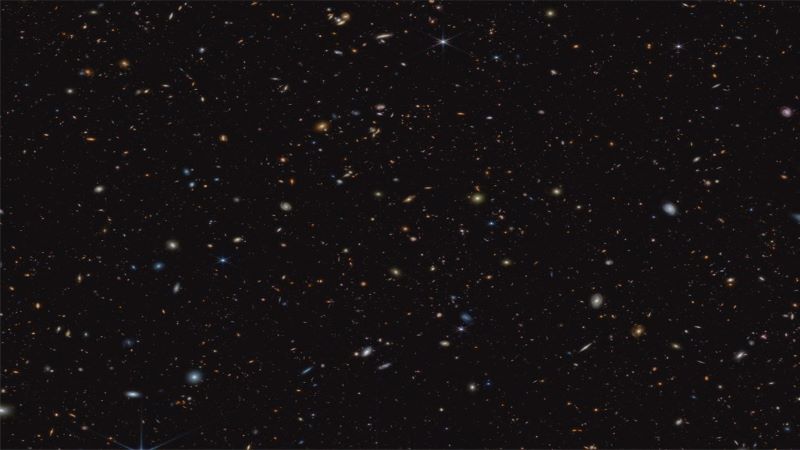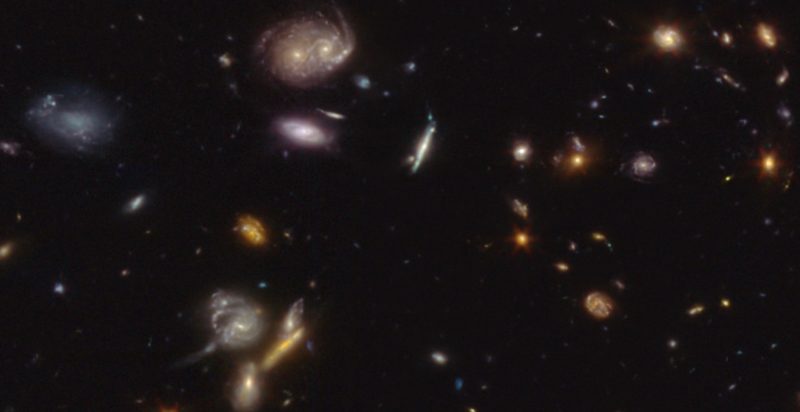
More than 45,000 baby galaxies!
On June 5, 2023, NASA released a new composite image from the James Webb Space Telescope. It shows our universe when it was less than 600 million years old. And, you can explore more than 45,000 baby galaxies in this image, especially if you zoom into the large interactive image.
Our universe is thought to be more than 13 billion years old. So – at 600 million years – the cosmos was in its infancy. The galaxies had just formed from the expanding cloud of most hydrogen gas, moving outward from the Big Bang. The statement accompanying the new Webb image release said:
The sheer number of these galaxies was far beyond predictions from observations made before Webb’s launch.
This image is part of the JWST Advanced Deep Extragalactic Survey, or JADES, program. It focuses on an area in Fornax called GOODS-South.
Acquiring the image
Scientists using Webb acquired these images between September 29 and October 10, 2022. The scientists used the NIRCam instrument on Webb with various filters for a wide sample of wavelength ranges. The image captures a region of sky about 6 arcminutes across. For comparison’s sake, the width of a full moon is about 30 arcminutes across.
Some of the galaxies in this image existed during the Epoch of Reionization. This is a time period that includes the appearance of the first stars and galaxies. It’s when the universe went from dark, dense, and opaque to transparent and lit with stars. Galaxies from this epoch show strong emission lines due to the creation of so many hot, massive stars.
Take some time to view the larger-sized image. Zoom in and explore the colorful array of distinct shapes of these island universes, composed of trillions of stars.

Bottom line: A new image from the James Webb Space Telescope shows more than 45,000 galaxies from when the universe was less than 600 million years old.
The post Glimpse 45,000 baby galaxies in the early universe first appeared on EarthSky.
from EarthSky https://ift.tt/lCGc0VF

More than 45,000 baby galaxies!
On June 5, 2023, NASA released a new composite image from the James Webb Space Telescope. It shows our universe when it was less than 600 million years old. And, you can explore more than 45,000 baby galaxies in this image, especially if you zoom into the large interactive image.
Our universe is thought to be more than 13 billion years old. So – at 600 million years – the cosmos was in its infancy. The galaxies had just formed from the expanding cloud of most hydrogen gas, moving outward from the Big Bang. The statement accompanying the new Webb image release said:
The sheer number of these galaxies was far beyond predictions from observations made before Webb’s launch.
This image is part of the JWST Advanced Deep Extragalactic Survey, or JADES, program. It focuses on an area in Fornax called GOODS-South.
Acquiring the image
Scientists using Webb acquired these images between September 29 and October 10, 2022. The scientists used the NIRCam instrument on Webb with various filters for a wide sample of wavelength ranges. The image captures a region of sky about 6 arcminutes across. For comparison’s sake, the width of a full moon is about 30 arcminutes across.
Some of the galaxies in this image existed during the Epoch of Reionization. This is a time period that includes the appearance of the first stars and galaxies. It’s when the universe went from dark, dense, and opaque to transparent and lit with stars. Galaxies from this epoch show strong emission lines due to the creation of so many hot, massive stars.
Take some time to view the larger-sized image. Zoom in and explore the colorful array of distinct shapes of these island universes, composed of trillions of stars.

Bottom line: A new image from the James Webb Space Telescope shows more than 45,000 galaxies from when the universe was less than 600 million years old.
The post Glimpse 45,000 baby galaxies in the early universe first appeared on EarthSky.
from EarthSky https://ift.tt/lCGc0VF

Aucun commentaire:
Enregistrer un commentaire